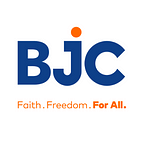Voucher-Funded Religious Education: A Threat to Religious Liberty
By BJC Associate General Counsel Jennifer Hawks
For several decades, the issue of school vouchers has been debated across the United States. While voucher programs vary from state to state, their basic structure is generally the same: state governments offer public dollars to parents to pay for private school tuition.
Apart from the disputed claims about the effectiveness of voucher programs to improve education, voucher programs seem to bring controversy in every state where they are proposed or enacted. Public education advocates point out that these programs divert necessary funds from away from public schools, especially public schools in rural communities. Civil rights groups argue that vouchers disadvantage students with disabilities, LGBTQ+ students and students of color, who are frequently underserved or under-protected in private schools.
One crucial argument has often been overlooked in the fight against the privatization of public schools: private school vouchers threaten religious liberty.
As a Christian minister and an advocate for religious liberty, I am grateful for the public schools that serve 90 percent of our nation’s children and help us learn how to live together as one community. However, I also support private, religious schools as spaces where both education and religious formation can flourish. As I noted in a 2015 article, religious schools have a dual mission. They provide a sound education in academic subjects while also providing religious education and spiritual formation for the continuation of a religious community. These schools have a different mission from public schools. They are not replacements for public education, and legislators should stop treating them as such.
When state governments divert public funds into private religious education through vouchers, they risk violating the First Amendment to the United States Constitution. The First Amendment makes two basic guarantees about religious freedom: that government will not prohibit the free exercise of religious beliefs (the Free Exercise Clause), and that government will not advance or inhibit religion (the Establishment Clause).
When private religious schools are funded by private donations, their ability to use religion as a factor for admission or in choosing their curriculum is generally uncontroversial. Many states protect this autonomy by imposing fewer regulations on privately funded religious schools.
Vouchers, in contrast, could give state governments the incentive to intervene and regulate admission or curriculum standards at private religious schools and could even motivate states to withhold funding from religious schools for politically motivated reasons.
Furthermore, while vouchers may stabilize funding for churches that run schools, vouchers may also lead to a decline in tithes and offerings for the church itself. According to a 2017 study of the oldest voucher program in the country, “voucher-accepting churches also saw a significant decrease in donations and, thus, had to reduce spending on items such as staff salaries, mission support, and church maintenance.”
If churches that run schools become financially dependent on government vouchers, they may be less inclined to raise a prophetic fist against an unjust government policy.
The government should not promote, prefer or pay for religion. Unfortunately, state funding of private religious schools undermines this historic principle by using the tax dollars of the religiously diverse American populace to pay for specific types of religious education.
Some argue that vouchers are no different than Pell Grants, which help low-income students attend college, including some religious colleges and universities. However, this is a faulty comparison. While college education in the U.S. is voluntary and expensive, K-12 education is compulsory and free. Pell Grants allow the federal government to incentivize college attendance and increase educational opportunities.
Furthermore, Pell Grants and vouchers are distinct programs with distinct characteristics. Since Pell Grants aid the institutions, the colleges and universities that choose to participate in the program must comply with several requirements including accreditation and public accountability — an example of the “strings” that accompany government funding. Vouchers, on the other hand, pass constitutional muster because they benefit the parent and not the school.
Vouchers will likely remain a subject of spirited debate in the public square for years to come, especially since the U.S. Department of Education has proposed a nationwide federal voucher program. When voters and lawmakers consider voucher programs, they should remember that vouchers threaten public schools, undermine private religious schools, and challenge the conscience rights of all American taxpayers. We should reject these programs and instead ensure that our tax dollars go to fair and equitable funding of our public school system. Public dollars. Public schools. Public accountability.
